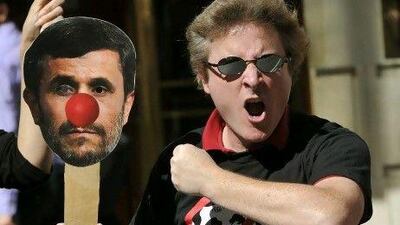Iran's publicity-loving president, Mahmoud Ahmadinejad, addresses the UN General Assembly in New York today for the eighth and final time in his turbulent career.
His swansong speech on the international stage comes during a period of acute tension, with Israel threatening military strikes against Iran's nuclear facilities.
With a re-election vote looming, Barack Obama, the US president, has no desire to be drawn into another Middle-East conflict. But he told the UN last night that Washington will "do what we must" to stop Iran acquiring nuclear weapons - an ambition Tehran denies.
Today, meanwhile, Mr Ahmadinejad is expected to be his "usual combative self, with grandiose ideas about managing the world's affairs while he cannot even manage Iran", said Muhammad Sahimi, an Iran expert at the University of Southern California.
Mr Ahmadinejad's annual jaunt to New York must be a welcome diversion from his myriad problems at home, where he is largely viewed as a spent force, his popularity and influence in rapid decline.
He has fallen out of favour with Iran's supreme leader, Ayatollah Ali Khamenei, and presides over an economy choked by western sanctions and a currency collapse that is firing inflation.
With an eye on his legacy, Mr Ahmadinejad will be keen to outdo his previous visits at the annual gathering, which have been full of sound and fury.
He is constitutionally bound to step down next summer after two four-year terms.
His past addresses have included Holocaust denials and conspiracy theories about the September 11 attacks on the US, prompting walkouts by US and European representatives.
Already this week Mr Ahmadinejad, 55, has attracted global media coverage in interviews in New York and a speech on Monday night that touched on topics he is likely to highlight today.
He again predicted the demise of Israel - which he called a nuclear-armed "fake regime" shielded by the US - and dismissed threats by "Zionists" against his country's "peaceful" nuclear facilities as a bluff.
Even so, he warned: "We have all the defensive measures at our disposal to defend ourselves".
Israel, he proclaimed, has no place in the Middle East, and Iran has been around for thousands of years while the modern state of Israel has existed only for the past 60 or so.
Mr Ahmadinejad also denounced Israel's occupation of Palestinian land and pledged to help end the civil war in Syria, Tehran's key strategic ally, declaring: "We see both sides as brothers."
In his speech today, Mr Ahmadinejad is expected to adopt a combative stance, playing mainly to an Iranian, Arab and the developing world gallery.
But he has tried to strike a more conciliatory tone in interviews with US and European media.
Aware that he is toxic to US public opinion, he tried to turn on the charm for American reporters, declaring: "I believe the people of the US are peace-loving people."
More vitally, he told the Washington Post he was willing to limit Iran's stockpile of enriched uranium to defuse the nuclear crisis.
Iran has "always been ready and we are ready" to make a deal that will address western concerns, he said.
But he doubted any progress in stalled nuclear negotiations with six world powers - the US, Britain, France, China, Russia and Germany - could be made until after the US presidential election in November.
Mr Ahmadinejad's excursion is receiving more coverage abroad than it is in Iran. Headlines in Tehran are dominated by economic woes and an unfolding political drama triggered by the arrest in recent days of a son and daughter of Akbar Hashemi Rafsanjani, a former president and founder of the Islamic republic.
In New York, no doubt to the surprise of his long-suffering people at home, the Iranian president minimised the impact of international sanctions, saying they are "not that bad".
Today, Mr Ahmadinejad is also expected to make much of Iran's current presidency of the Non-Aligned Movement (NAM), whose members, mostly from the Middle East, Africa and Asia, form the biggest voting bloc in the 193-nation General Assembly.
Tehran's aim is to rebuild NAM as a counterweight to dominance by the five veto-wielding permanent members of the UN Security Council, in particular the "global arrogance" of the US.
Mr Ahmadinejad sees himself as a historic leader determined to restore Iran to the ranks of the world's superpowers.
But his grandstanding abroad has been pricked at home. Iran's moderate Mardom Salari daily scoffed on Monday that Mr Ahmadinejad's speeches at the UN General Assembly have become a "monotonous" and "repetitive" affair". His annual trip to the Big Apple, this time with a 140-strong entourage, puts a huge burden on Iran's purse strings, the newspaper grumbled.
Farideh Farhi, an Iran specialist at the University of Hawaii, said Iran's people and political elite were "just waiting for the next presidential election to make him leave his post".
Mr Ahmadinejad, however, told reporters he could stay active in politics after his presidency ends. He said he might return as part of future Iranian delegations to New York.

